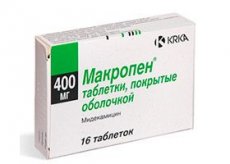Medical expert of the article
New publications
Preparations
Macropene
Last reviewed: 03.07.2025

All iLive content is medically reviewed or fact checked to ensure as much factual accuracy as possible.
We have strict sourcing guidelines and only link to reputable media sites, academic research institutions and, whenever possible, medically peer reviewed studies. Note that the numbers in parentheses ([1], [2], etc.) are clickable links to these studies.
If you feel that any of our content is inaccurate, out-of-date, or otherwise questionable, please select it and press Ctrl + Enter.

Indications Macropene
Indications include infectious processes caused by the activity of pathogenic microbes sensitive to the drug:
- in the respiratory tract;
- in the genitourinary system;
- on the skin or mucous membranes;
- enteritis caused by campylobacter;
- to eliminate whooping cough and diphtheria;
- for the treatment of patients with allergies to penicillin antibiotics.
 [ 3 ]
[ 3 ]
Release form
It is available in the form of tablets or powder for suspension. The volume of tablets is 400 mg. One pack contains 16 tablets. The volume of the bottle for making the suspension is 115 ml.
 [ 4 ]
[ 4 ]
Pharmacodynamics
The active component of the drug is midecamycin. It has an effect on: gram-positive microbes (such as staphylococci and streptococci, listeria with clostridia, and corynebacteria), as well as intracellular organisms (chlamydia and mycoplasma, as well as legionella and ureaplasma) and gram-negative microbes (campylobacter and helicobacter, as well as moraxella, bacteroides and influenza bacillus).
Pharmacokinetics
After oral administration, Macropen is completely and fairly quickly absorbed from the gastrointestinal tract. The peak concentration is reached after 1-2 hours. The drug accumulates in the affected areas, as well as in the skin and bronchial secretions. The drug is excreted mainly through the liver.
 [ 5 ]
[ 5 ]
Dosing and administration
The suspension is usually used for children. It is taken twice a day, and the dosage should be calculated depending on the baby's weight:
- for weight less than 5 kg the dose is 3.75 ml (correspondingly 131.25 mg);
- 5-10 kg – dosage 7.5 ml (correspondingly 262.2 mg);
- within 10-15 kg – 10 ml (correspondingly 350 mg);
- within 15-20 kg – dose 15 ml (correspondingly 525 mg);
- weight within 20-25 kg – dose 22.5 ml (correspondingly 787.5 mg).
To prepare a suspension, add water (100 ml) to the powder in the bottle.
Children weighing over 30 kg, as well as adults, are required to take tablets - 1 tablet 3 times a day.
Children can take no more than 30-50 mcg/kg of Macropen per day. The daily dosage should be divided into 2 parts. Adults can take a maximum of 1.6 g of the drug per day - the daily dosage is divided into 3 parts.
The treatment course generally lasts a maximum of 1-1.5 weeks, only in case of chlamydial infection this period can be extended to 2 weeks.
Use Macropene during pregnancy
Macropen is permitted for use during pregnancy, but it is still recommended to prescribe it only when the possible therapeutic benefit outweighs the risk of negative consequences for the fetus.
Side effects Macropene
As a result of taking the drug, the following side effects may be observed: loss of appetite (sometimes this can lead to the development of anorexia), nausea (sometimes vomiting), allergies that appear on the skin (also accompanied by eosinophilia), and an increase in the number of liver enzymes.
 [ 8 ]
[ 8 ]
Overdose
There are no specific signs of an overdose of Macropen - if the recommended dose is exceeded, vomiting with nausea may begin.
As a treatment, sorbents should be used to speed up the process of removing the drug from the body, and in addition, procedures should be carried out to eliminate unpleasant symptoms.
Interactions with other drugs
Macropen should not be combined with drugs based on carbamazepine or ergot, because the drug can increase their level in the blood, resulting in changes in the transformation processes in the liver.
In addition, it is prohibited to use Macropen while undergoing treatment with warfarin and cyclosporine.
 [ 11 ]
[ 11 ]
Storage conditions
The medicine (both tablets and granules) must be kept in a place closed to children and moisture. The temperature conditions are a maximum of 25°C. It is recommended to keep the prepared suspension in the refrigerator.
Shelf life
Macropen is permitted to be used for 3 years from the date of manufacture of the medicine.
The prepared suspension can be used for 2 weeks (if the medicine is kept in the refrigerator), or 1 week (at a temperature of no more than 25°C).
 [ 12 ]
[ 12 ]
Attention!
To simplify the perception of information, this instruction for use of the drug "Macropene" translated and presented in a special form on the basis of the official instructions for medical use of the drug. Before use read the annotation that came directly to medicines.
Description provided for informational purposes and is not a guide to self-healing. The need for this drug, the purpose of the treatment regimen, methods and dose of the drug is determined solely by the attending physician. Self-medication is dangerous for your health.

